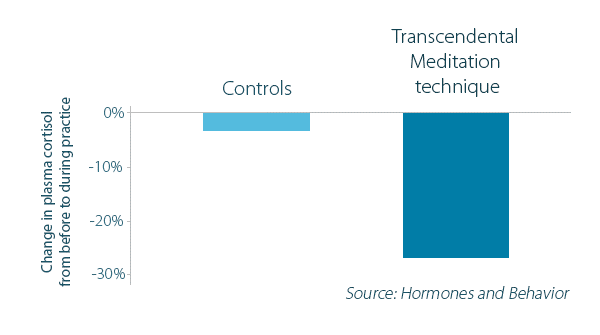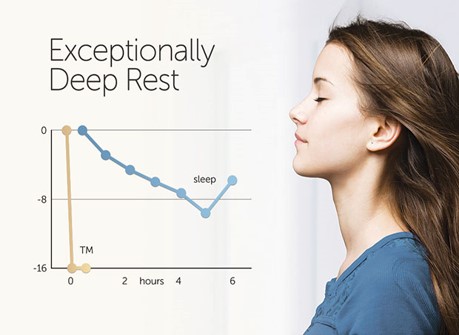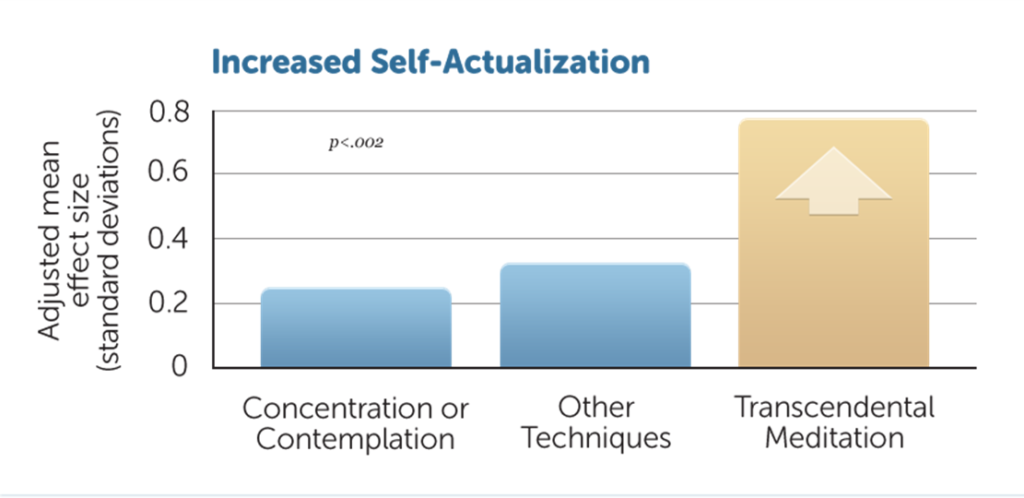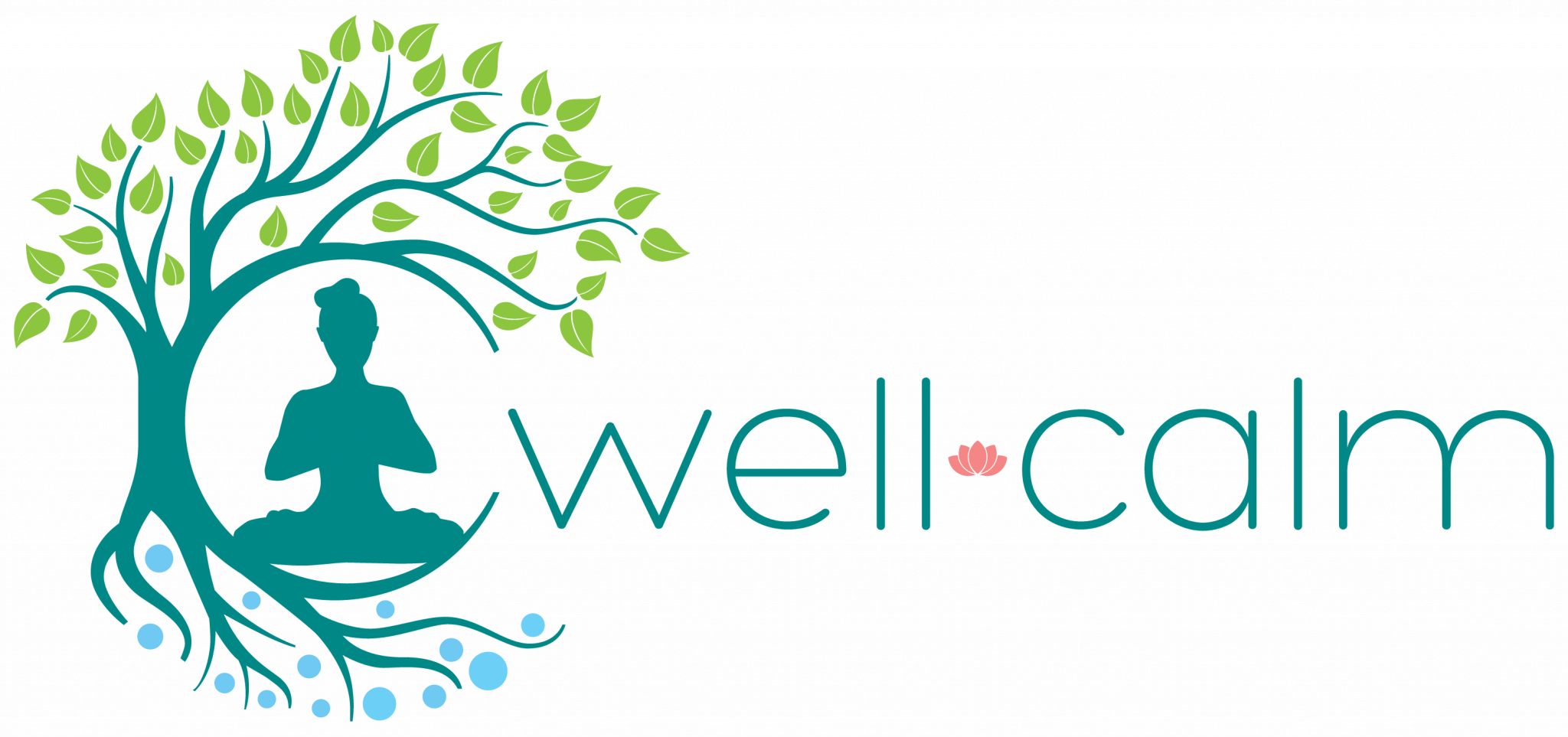TM Promotes Calmness – Reducing Stress and Anxiety
The TM technique’s benefits start right away, and keep growing. Hundreds of independent research studies have found major increases in calmness, creativity, energy, clarity of mind, and happiness.
It’s simple — with too much stress, you can’t enjoy your life. It also puts your health at risk, and contributes to a host of problems — anxiety, insomnia, fatigue and more. Millions of people have found the TM technique has a transforming effect:
Hundreds of published research studies verify these experiences. No other form of meditation has such a body of evidence supporting these benefits.
– greatly reduced stress and anxiety
– clearer thinking
– better sleep
– brighter, more positive state of mind
In a study on Vietnam war veterans 30 years ago, the TM group already saw significant improvements (reduced PTSD, anxiety, depression, insomnia, alcoholism, and improved stress resistance) that after only 3 months of practice 70% of the war veterans required no further treatment. The control group that received standard psychotherapy showed no improvement.
Ref. Journal of Counseling and Development 64: 212–215, 1985


TM’s effect on cortisol — the stress hormone
A landmark study published in Hormones and Behavior found the TM technique reduces cortisol by 30%.
Plasma cortisol is a stress hormone. The study shows that plasma cortisol decreased during Transcendental Meditation, whereas it did not change significantly in control subjects during ordinary relaxation.
Reference: Adrenocortical activity during meditation, Hormones and Behavior 10(1): 54-60, 1978.
Stanford study on anxiety
Researchers at Stanford University conducted a meta-analysis of 146 independent studies on the effect of various meditation techniques on anxiety. The study, published in the Journal of Clinical Psychology, found that the TM technique is twice as effective at reducing anxiety.

Promotes Better Sleep
One of the most common causes for sleeping problems is an abnormally low level of the “happiness hormone” serotonin. Stress is a big influence on this. As the normal functioning of the nervous system is disrupted, serotonin production will decrease. The practice of Transcendental Meditation increases the serotonin level spontaneously and reduces the level stress-related hormones, which affects a large number of areas in life particularly the quality of sleep.
When we activate the body’s own healing power, we may notice that our sleep improves spontaneously.
Sleep is an unconscious process where the body will gradually experience deeper stages of rest, as shown on the graph below. During TM, on the other hand, we consciously direct the mind inward, and allow the mind to gravitate to a state of complete inner silence, which, if allowed, the mind will do very quickly. This process will also pull the body in a state of deep relaxation, far deeper than sleep.
This graph from a Harvard Medical School research study shows this clearly: during TM the body almost immediately comes into a state of rest that is far deeper than even the deepest rest during sleep, which is usually only reached after several hours of sleep. (state of rest is measured by reduced oxygen consumption). More than 30 studies around the world have by now confirmed the deep state of rest during TM practice.
Ref. American Psychologist, 1987, 42: 879-881.

Self-Actualization
In Transcending = being yourself, we describe that the extent to which someone is successful in life depends for a large part on how much one is able to remain oneself. This can be measured objectively, as can the effects of TM on it.
How much someone is able to remain oneself can be measured through a psychological benchmark called self-actualisation. Based on the measures developed by the American psychologist Abraham Maslow, after having studied a large group of exceptionally successful individuals, both personally and professionally, he discovered that successful people all had one thing in common: they were much better able to remain themselves, regardless of the situation they found themselves.

The study shown here is a meta-analysis of all scientific studies ever carried out around the effects of different meditation techniques on self-actualisation. (42 studies in total, 18 of which were TM studies) The average effect of all other techniques ever researched showed only a small effect. The average effect of the TM studies is 3 to 4 times as big.
Ref. Journal of Social Behaviour and Personality, vol. 6, 1991, pp 189-247
